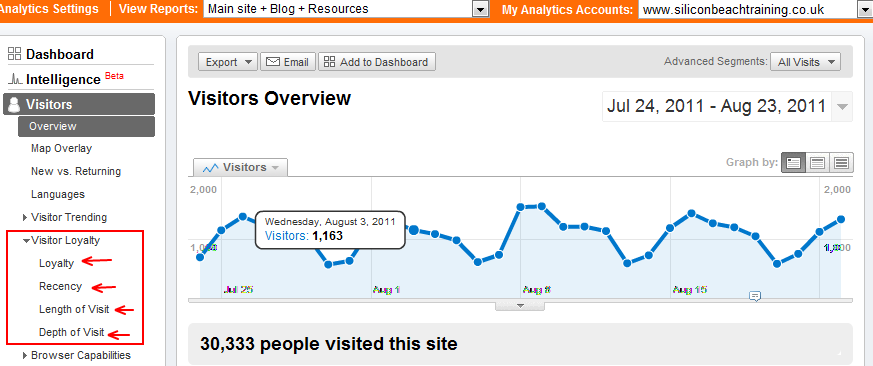Everyone talks about ROI (return on investment) and many businesses use Google Analytics to measure the ROI of their internet marketing endeavours using the number of sales measured against the data they get from user activity before they "add to cart" or similar.
What if you have no e-commerce on your site? Maybe you provide a service, provide information, market a cause or a brand and there is no on-line payment transaction to enable this type of analysis. What should you be measuring? How can you use Google Analytics data to interpret the success of a visit to your website?

Whilst the jury is still out about how much Google uses visitor loyalty data when calculating the quality of your site. I think it is safe to presume that after the Google Panda update, these metrics are becoming much more relevant to page position in the SERP's than before. If you follow our surviving the Google Panda update guidelines, you will be well on your way to solving any problems that you discover when analysing your visitor loyalty.
If you are new to Google Analytics I would strongly recommend our Google Analytics Course, we get rave reviews. For those who are familiar with the basics, you can fine-tune your master skills on our Advanced Google Analytics Course, we also provide SEO training, however back to the plot.
Measuring Visitor Loyalty in Google Analytics
We recommend measuring successful visits using the four different metrics in the "Visitor Loyalty" section of Google Analytics found in the Visitors section that appears when you log into your account:
- Loyalty
- Recency
- Length of Visit
- Depth of Visit

The fact that Google Analytics shows you the distribution of the metrics is key to being able to use this data in a way that allows you to analyse and measure success.
Heather Buckley
25 Aug 2011
Everyone talks about ROI (return on investment) and many businesses use Google Analytics to measure the ROI of their internet marketing endeavours using the number of sales measured against the data they get from user activity before they "add to cart" or similar.
What if you have no e-commerce on your site? Maybe you provide a service, provide information, market a cause or a brand and there is no on-line payment transaction to enable this type of analysis. What should you be measuring? How can you use Google Analytics data to interpret the success of a visit to your website?

Whilst the jury is still out about how much Google uses visitor loyalty data when calculating the quality of your site. I think it is safe to presume that after the Google Panda update, these metrics are becoming much more relevant to page position in the SERP's than before. If you follow our surviving the Google Panda update guidelines, you will be well on your way to solving any problems that you discover when analysing your visitor loyalty.
If you are new to Google Analytics I would strongly recommend our Google Analytics Course, we get rave reviews. For those who are familiar with the basics, you can fine-tune your master skills on our Advanced Google Analytics Course, we also provide SEO training, however back to the plot.
Measuring Visitor Loyalty in Google Analytics
We recommend measuring successful visits using the four different metrics in the "Visitor Loyalty" section of Google Analytics found in the Visitors section that appears when you log into your account:
- Loyalty
- Recency
- Length of Visit
- Depth of Visit

The fact that Google Analytics shows you the distribution of the metrics is key to being able to use this data in a way that allows you to analyse and measure success.
Heather Buckley
25 Aug 2011
The full BrightonSEO 2011 Round Up is the most comprehensive available. We feature our pick of the best round ups alongside our own round up with video, slides and comments.
The second speaker at BrightonSEO 2011 got everyone talking and tweeting. John McElborough gave his advice on building a private blog network and added a pinch of controversy to the morning. The usual twitter buzz was rising to a crescendo and #BrightonSEO was trending, but spattered amongst the "Best ever" tributes and tweets of resounding praise were a few disgruntled SEO'ers in the audience tweeting about lack of ethics and Black Hat tactics. I'd like to point out that this is a FREE event. If it were highly priced, superbly slick and full of uber expensive Key Notes we wouldn't see the likes of John McElborough and his honest account of Quick fix SEO. He didn't claim to be ethical, and he was quite open about the fact that in the near future this may not work, he was aware that the Panda Update was still being tweaked and that tomorrow he could be wiped off the face of Google.
He also admitted that Fake Whois identities may not be a great long term plan. I loved his honesty. If it were expensive we probably wouldn't have the privilege of seeing John and having a good debate about it. We probably wouldn't see people like Dave Peiris - @sharkseo. I like the eclectic mix of speakers. If Brighton SEO continues to grow the way it has over the last two years (far from it's humble beginnings upstairs in the pub) we may begin to see less of the Johns of SEO and more high profile Keynotes and polished presentations, then we might be missing something.
I think Kelvin Newman put on a great show. He "owned the stage" as Simon Cowell would say, "he nailed it", Kelvin has the XFactor.
Don't forget to watch the video - juicy debate recorded as well as the presentation.
Building a Private Blog Network - a controversial talk by John McElborough at #Brighton SEO

John McElborough - Brighton SEO
McElborough told his audience to leave ethics behind, asking them to make their own minds up on whether his strategy is white hat or black hat.
John McElborough's method (building a private blog network) is to create a network of anything from 20-100 private blogs, all linking back to a main site. He went on to tell you how to make the domains all look as if they are on different servers with unique IP addresses, and even suggested that you fake your ID on Who-Is when you register the domains. The idea is to build up lots of easy links from each of the domains to each other and to your main site, as well as building up the authority of each private blog using traditional link building techniques.
Black Hat tactics?
He started by talking about the content of the blogs, starting with 5-10 posts on each site, he suggested using interns, students and writer samples. The acquisition of content by these means didn't sit well with the copywriters at the event as explained on Ensign Jen's blog. He is obviously going with the quantity not quality angle here.
Heather Buckley
13 Sep 2011
The full BrightonSEO 2011 Round Up is the most comprehensive available. We feature our pick of the best round ups alongside our own round up with video, slides and comments.
The second speaker at BrightonSEO 2011 got everyone talking and tweeting. John McElborough gave his advice on building a private blog network and added a pinch of controversy to the morning. The usual twitter buzz was rising to a crescendo and #BrightonSEO was trending, but spattered amongst the "Best ever" tributes and tweets of resounding praise were a few disgruntled SEO'ers in the audience tweeting about lack of ethics and Black Hat tactics. I'd like to point out that this is a FREE event. If it were highly priced, superbly slick and full of uber expensive Key Notes we wouldn't see the likes of John McElborough and his honest account of Quick fix SEO. He didn't claim to be ethical, and he was quite open about the fact that in the near future this may not work, he was aware that the Panda Update was still being tweaked and that tomorrow he could be wiped off the face of Google.
He also admitted that Fake Whois identities may not be a great long term plan. I loved his honesty. If it were expensive we probably wouldn't have the privilege of seeing John and having a good debate about it. We probably wouldn't see people like Dave Peiris - @sharkseo. I like the eclectic mix of speakers. If Brighton SEO continues to grow the way it has over the last two years (far from it's humble beginnings upstairs in the pub) we may begin to see less of the Johns of SEO and more high profile Keynotes and polished presentations, then we might be missing something.
I think Kelvin Newman put on a great show. He "owned the stage" as Simon Cowell would say, "he nailed it", Kelvin has the XFactor.
Don't forget to watch the video - juicy debate recorded as well as the presentation.
Building a Private Blog Network - a controversial talk by John McElborough at #Brighton SEO

John McElborough - Brighton SEO
McElborough told his audience to leave ethics behind, asking them to make their own minds up on whether his strategy is white hat or black hat.
John McElborough's method (building a private blog network) is to create a network of anything from 20-100 private blogs, all linking back to a main site. He went on to tell you how to make the domains all look as if they are on different servers with unique IP addresses, and even suggested that you fake your ID on Who-Is when you register the domains. The idea is to build up lots of easy links from each of the domains to each other and to your main site, as well as building up the authority of each private blog using traditional link building techniques.
Black Hat tactics?
He started by talking about the content of the blogs, starting with 5-10 posts on each site, he suggested using interns, students and writer samples. The acquisition of content by these means didn't sit well with the copywriters at the event as explained on Ensign Jen's blog. He is obviously going with the quantity not quality angle here.
Heather Buckley
13 Sep 2011
Below you'll find a comprehensive list of Social Media Tips,Guides, Plugins, Platforms, Analytics Tools, Apps and other great Social Media resources. This list is designed as a reference guide for delegates who have attended our Social Networking training or SEO training courses in Brighton, Sussex - but it would be mean of us not to make it available to everyone. We also provide creative courses like Photoshop Training and Leadership and Management Training like PRINCE2 Training and Business Analysis Courses. Enjoy...

Aaron Charlie
5 Jan 2010
Below you'll find a comprehensive list of Social Media Tips,Guides, Plugins, Platforms, Analytics Tools, Apps and other great Social Media resources. This list is designed as a reference guide for delegates who have attended our Social Networking training or SEO training courses in Brighton, Sussex - but it would be mean of us not to make it available to everyone. We also provide creative courses like Photoshop Training and Leadership and Management Training like PRINCE2 Training and Business Analysis Courses. Enjoy...

Aaron Charlie
5 Jan 2010
10 years ago I was writing my dissertation on Women and the Internet.It was a revelation then how women were using this relatively new medium (new as in 'popular and accessible') to communicate, connect and network. Previously technological gadgets, including computers, were largely bought by men - toys for boys. The internet changed all that.
Last night I attended a talk by Miss Aniela, whose rapid rise to fame was due to her immersion in social media, firstly by using Flickr and more recently Facebook and Twitter. Those interested in building up their own online presence using social media may be interested in our training courses.
You can learn more about marketing your business or organisation via Facebook on our Social Media Training course. We also run regular creative courses including Photoshop Training & InDesign training in Brighton.

Now 10 years after the internet changed the way women interacted with computers another wave of change is upon us. Social media networks have seen phenomenal growth in terms of numbers of users both for individuals and business. The biggest growth can be seen in the number of women using social networks on a regular basis. Women now outnumber men on the following networks:
- Facebook: 57 percent women users.
- Twitter: 57 percent women users.
- Flickr: 55 percent women users.
Source: Information is Beautiful
Why Do you Think That is?
Look at the statistics from the 2009 Women and Social Media Study By BlogHer, iVillage and Compass Partners
Women who blog were asked what motivated them to blog. These were the results:
- 76% for fun
- 73% Express myself
- 59% Connect with others like me
- 54% Personal record or diary
- 37% To give advice/educate
- 33 % Positive reactions and feedback from my audience
- 29% Establish or contribute to a community
- 25% To reach large audience
- 22% To persuade others/advocate
- 21% Promote my skills or my business
- 17% Earn money
I think although I have no data to back this up, that if you asked most businesses why they would consider using social media to promote their business you could practically reverse the above stats. It's not that it's a bad thing to want to be successful in business, to want to promote yourself or to make money or sell. It's just that in order to do these things using social media you need to do the other stuff first - listen, give, communicate - otherwise it won't work.
Heather Buckley
11 Nov 2009
10 years ago I was writing my dissertation on Women and the Internet.It was a revelation then how women were using this relatively new medium (new as in 'popular and accessible') to communicate, connect and network. Previously technological gadgets, including computers, were largely bought by men - toys for boys. The internet changed all that.
Last night I attended a talk by Miss Aniela, whose rapid rise to fame was due to her immersion in social media, firstly by using Flickr and more recently Facebook and Twitter. Those interested in building up their own online presence using social media may be interested in our training courses.
You can learn more about marketing your business or organisation via Facebook on our Social Media Training course. We also run regular creative courses including Photoshop Training & InDesign training in Brighton.

Now 10 years after the internet changed the way women interacted with computers another wave of change is upon us. Social media networks have seen phenomenal growth in terms of numbers of users both for individuals and business. The biggest growth can be seen in the number of women using social networks on a regular basis. Women now outnumber men on the following networks:
- Facebook: 57 percent women users.
- Twitter: 57 percent women users.
- Flickr: 55 percent women users.
Source: Information is Beautiful
Why Do you Think That is?
Look at the statistics from the 2009 Women and Social Media Study By BlogHer, iVillage and Compass Partners
Women who blog were asked what motivated them to blog. These were the results:
- 76% for fun
- 73% Express myself
- 59% Connect with others like me
- 54% Personal record or diary
- 37% To give advice/educate
- 33 % Positive reactions and feedback from my audience
- 29% Establish or contribute to a community
- 25% To reach large audience
- 22% To persuade others/advocate
- 21% Promote my skills or my business
- 17% Earn money
I think although I have no data to back this up, that if you asked most businesses why they would consider using social media to promote their business you could practically reverse the above stats. It's not that it's a bad thing to want to be successful in business, to want to promote yourself or to make money or sell. It's just that in order to do these things using social media you need to do the other stuff first - listen, give, communicate - otherwise it won't work.
Heather Buckley
11 Nov 2009